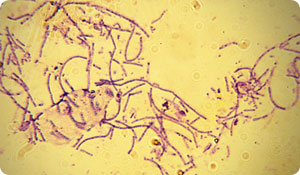
See what people are saying about this article on our Facebook page!![]()
The very idea of using worms to treat intestinal diseases may be enough to turn your stomach. And while it make take some time before such a regimen is actually prescribed to patients, studies in which parasitic worms are used to battle disorders like Crohn's disease and ulcerative colitis are showing promising results.
To understand why parasitic worms would even be considered as a treatment, it's necessary to understand why immune-mediated diseases like Crohn's are on the rise, says David Rubin, MD, co-director of the Inflammatory Bowel Disease Center at the University of Chicago Medical Center.
"One theory is that we are not getting exposed to the things in the environment that our bodies were built to protect us from," he says. "There's a critical time in the development of our immune system when it needs to be exposed to certain infections in the outside world. This is so our bodies can be prepared to protect us when we do get exposed to infections."
When the necessary exposure doesn't happen, an exposure to a pathogen actually occurs, Rubin explains, and the body responds by unfurling an uncontrolled immune response that can't be turned off. In immune-mediated illnesses like Crohn's and ulcerative colitis, patients continually suffer from symptoms with no respite.
Current treatments for these illnesses can suppress the patient's immune system, but there are drawbacks. So researchers came up with another concept: to see whether it was possible to trigger a more natural immune system response in a person. "The ideas was, if you give someone a parasite, could you trigger the immune response to react to it, and then reset that other part of the immune response that is abnormal?" Rubin says. "It's like hitting control, alt, delete on your immune system. Can you reboot your immune system?" It turns out the answer could be yes.
"It has been studied and has some very promising results in the United States," Rubin says. "It's something we are interested in, but it is not ready for our patients yet." The particular parasite that was studied, he explains, is a pig whipworm. And it's actually not the worm itself, but the eggs, that bring about the desired immune response.
While research is underway and ongoing, there's not yet enough information on long term safety or on which patients could be helped. Often, the sickest patients tend to seek out new therapies, and they're also the most likely to have complications, Rubin explains. Although the research is very preliminary, it's fascinating, says Irwin Grosman, MD, chief of gastroenterology at Long Island College Hospital in New York City. "We definitely aren't recommending that our patients with inflammatory bowel disease rush out and find some therapeutic worms to ingest," he says. "But the literature shows that there is some efficacy at administering a non-pathogenic worm to treat IBD. Some of the people in the study did get better with the treatment."
In the meantime, for those who suffer from inflammatory bowel disease, Rubin has this advice: "I would tell people to stay tuned, talk to your doctor, and be aware that more is needed in terms of safety," he says. "There are a lot of promising therapies already available, and more to come."
See what people are saying about this article on our Facebook page!![]()
Source:
Thomas, Tanya, "Swallow worms (instead of pills) to fight irritable bowel disease, allergies." 15 November 2010. Medindia.net.
http://www.medindia.net/news/Swallow-Worms-Instead-of-Pills-To-Fight-Irritable-Bowel-Disease-Allergies-76711-1.htm





